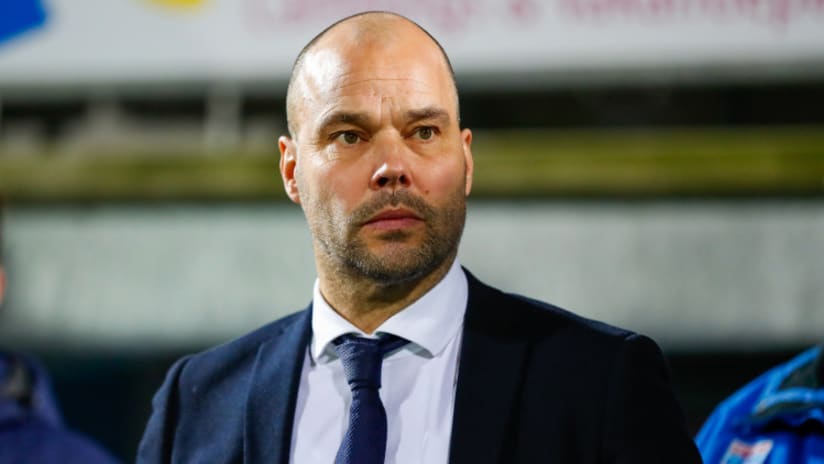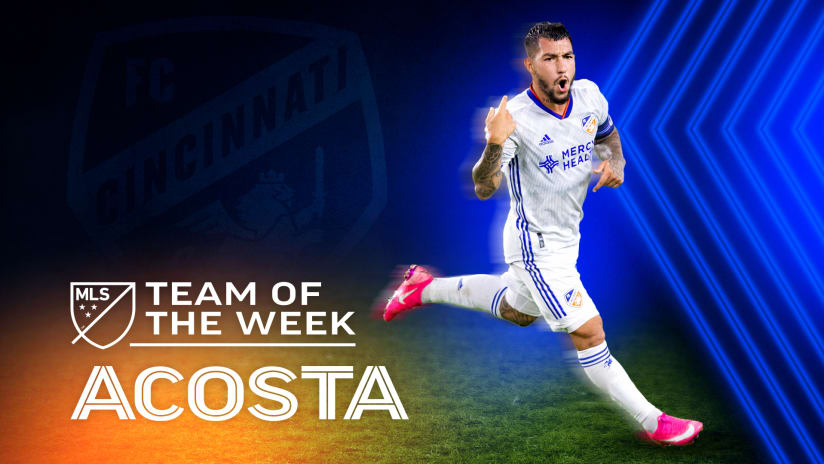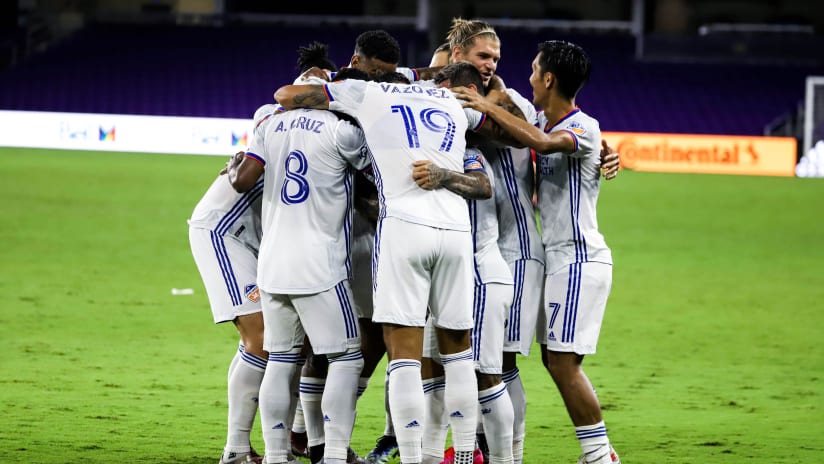ZWOLLE, The Netherlands – Gerard Nijkamp grabs his keys, smiles and jangles them in the air.
“Thursday is my last day and I give my keys to the president,” Nijkamp said. “Then, it’s finished at PEC Zwolle.”
Thursday was still two days away, and there was more work to accomplish. For starters, the MLS summer transfer window opened that morning, and Zwolle hosts POAK Thessaloniki FC in a preseason friendly that night.
The next day, the team would announce a new summer signing. The following day – Nijkamp’s last – would end in him, yes, giving his keys to club chairman Adriaan Visser, but the club giving him a send-off ceremony in return.
“From one side, I’m very happy and positive and I have big energy to build something on the other side of the ocean,” Nijkamp said. “Then on the other side, I feel a bit sad because I give my child away…There’s a little grieving.
“There will be some tears coming on Thursday, but I think that is only good when you are working very close with each other.”
After seven seasons with PEC Zwolle, in May he announced he was departing for a new opportunity with a new club in a new part of the world: FC Cincinnati. There, he’ll be the MLS expansion side’s general manager.
As a result, Nijkamp had two months to tie up loose ends, complete his final business in Zwolle and then say goodbye to a club and a project he self-described as “my child."
He arrived at the Dutch club in July 2012 as the new technical director with one simple objective: keep Zwolle in the Eredivisie.
To this point, he’s done that. But he also did more.
Since 2012, he overhauled the club’s image of itself and its image in the community. He encouraged attractive voetbal (soccer) while making shrewd business moves and strengthening the club’s youth academy. In short, he helped make PEC Zwolle, a then newly-promoted side, believe in itself that it can achieve more.
And since his appointment, theres’s been more.
Now, Nijkamp will have to do the same thing with FC Cincinnati. But before looking too far into his arrival in the U.S., it’s worth revisiting what he’s saying goodbye to in the Netherlands.
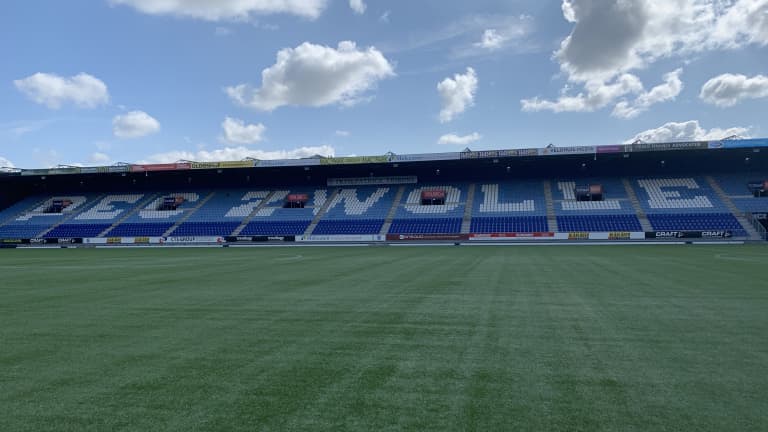
Getting (back) to Zwolle
All Visser knew about Nijkamp was that he’d worked for PEC Zwolle previously and seemed interested in doing so again.
Before going to lead academies at two Qatari clubs, Nijkamp had done the same for Zwolle, and had even been the team’s interim manager for two matches.
But this was for a different job.
Zwolle were the 2011-12 Jupiler League champions and were promoted to the country’s first division, the Eredivisie, for the first time since the 2003-04 season. A new league meant a new beginning.
For starters, the team was renamed PEC Zwolle from FC Zwolle – a return to their old name before the club went into bankruptcy long before Nijkamp’s first stint at the team.
With a new team name, a newly-renamed stadium and a new club structure, Visser wanted to be the chairman not only for a first-division club, but a side that’d become a mainstay in the league.
“The expectation was to stay in the Eredivisie and not go down,” Visser said.
To do that, he needed a smart technical director who could achieve his one goal.
So, perhaps, Nijkamp could help with that and help balance the soccer budget.
Nijkamp later said, “There were a lot of costs and not so many revenues.” The two had a phone call, then a meeting. After that, Visser hired Nijkamp and – while he didn’t know it then – Visser found the technical director to reinvent his club.
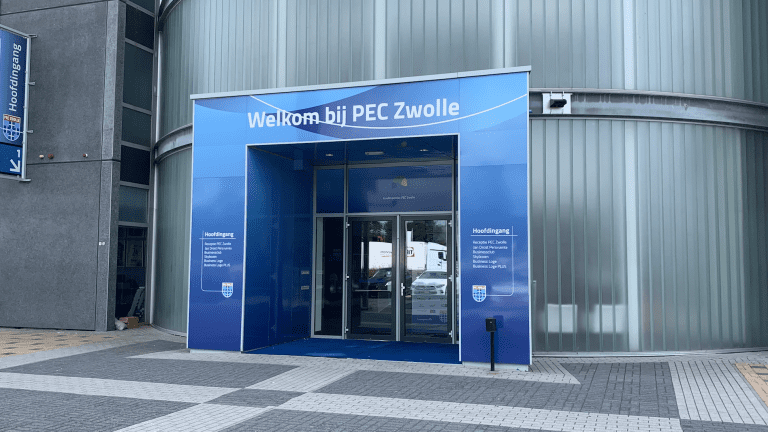
Welkom bij PEC Zwolle
If you walk through the business entrance to MAC3PARK Stadion, three things instantly stand out.
Straight ahead are glass doors leading to the turf field. On the immediate left are life-size cutouts of three PEC Zwolle players standing beside the club mascot in the newly-released home jersey. In between the cutouts and the field is a blue trophy case. Inside are the team’s – and Nijkamp’s – biggest accomplishments.
“The objective (Adriaan Visser) gave me was we want to be 10 years in the Eredivisie,” Nijkamp said sitting at a conference table inside his office. Behind him was another desk – assuming for personal use – with walls filled with memorabilia and framed editions of previous blue-and-white striped Zwolle jerseys.
“(I needed to) create a sustainable team with consistency in the squad that is in the standard of the Eredivisie. So, if you see what is happening in the Eredivisie from 2012 until today, we succeeded in our goals we set, seven years in the Eredivisie and eight next year.”
But that detail only scratches the surface.
Under Nijkamp, PEC Zwolle did more than just survive in the league – although they made a head coaching change midway through last season when they sat in the relegation zone and eventually finished 12th.
In fact, they thrived.
After finishing 11th in league in 2012-13, Nijkamp appointed a manager for the first time: Ron Jans.
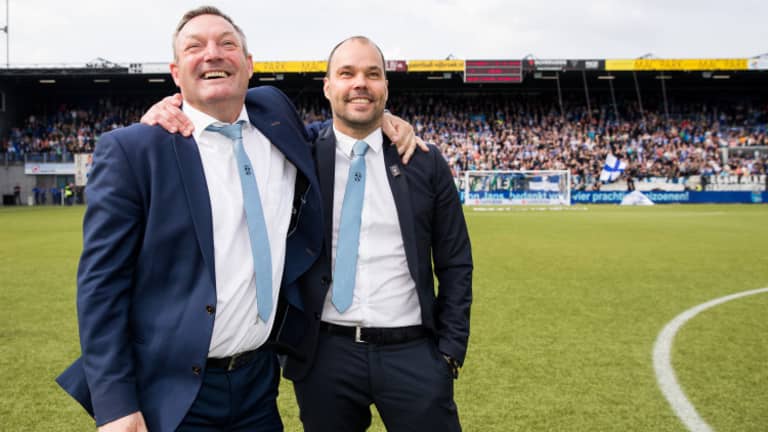
Jans and Nijkamp. photo from peczwolle.nl
Born in Zwolle, Jans played more than 150 matches for the club to begin his professional career. As the head coach, this was a chance for him to make an even greater impression.
During the season, Jans led Zwolle to the KNVB Cup and beat Ajax 5-1 to seal the club’s first major trophy in its history. (The KNVB Cup is the Dutch equivalent to the Lamar Hunt U.S. Open Cup.)
As a result, the club qualified for the UEFA Europa League for the first time ever. And while it was eliminated by AC Sparta Prague before making the tournament’s group stage, the KNVB national championship was a sign that PEC Zwolle was growing.
Later that summer, they beat Ajax again for another trophy, the Johan Cruijff Schaal (the Dutch Super Cup).
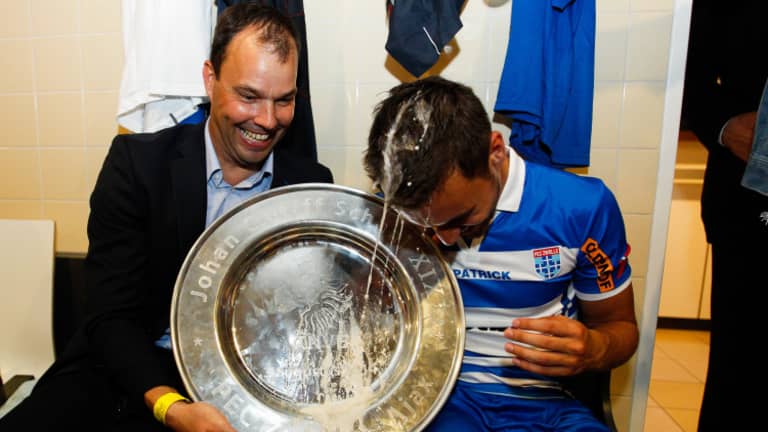
Nijkamp with a player after winning the Johan Cruijff Schaal over Ajax. photo from peczwolle.nl
It was the best summer in the club’s history since its founding in June 1910. But the growing continued, and Zwolle finished sixth in the Eredivisie in 2014-15 and eighth the next season.
Once a club that dreamed of just being in the first division, PEC Zwolle were becoming regulars. In return, that meant less pressure on gaining points and more on enhancing the overall quality of soccer at the club.
Nijkamp’s teams play good soccer. If not, then there’d be no reason for a center back to be so proud of it that he mentioned “attractive” or “attacking football” four times 90 seconds into an interview.
But that’s what Dirk Marcellis believes.
Now a club employee, he’s a former PEC Zwolle player who played for the Netherlands National Team during the 2008 Summer Olympics in Beijing and in qualifiers for the 2010 FIFA World Cup in South Africa – a tournament that saw the Dutch finish second for a third time.
(It’s become something of a national stereotype – or self-pity – for the Dutch to finish second in a World Cup, even if they gifted the world with the most-beautiful playing style and often outplay their opponents. Ironically, the Dutch kept the second-place standard going when they lost to the U.S. Women’s National Team in the 2019 FIFA World Cup final earlier this month in France.)
“When Gerard started here, it was nothing or a little small club,” Marcellis said. “But with an attacking style of playing football, he captured the hearts of fans in Holland … The moment they were promoted to the Eredivisie, they keep making big steps, especially in the way of play.
“That’s how they’ve shown the whole Netherlands that it was a small club, but it was so positive with all the news around it.”
In truth, if he didn’t believe in Nijkamp’s standard for the club identity and philosophy, there’d be no significant reason for Marcellis to stay. He was born in the south of the country and Zwolle is in the east. He also started his career with PSV Eindhoven, the second-biggest club in the Netherlands and a former European champion.
“Zwolle is known for its positive play of football,” he said. “It’s quite attacking and we want fans to enjoy the game. That’s what I want … They just keep growing and growing and growing with a really positive atmosphere and way of playing. That’s what attracted me to it.”
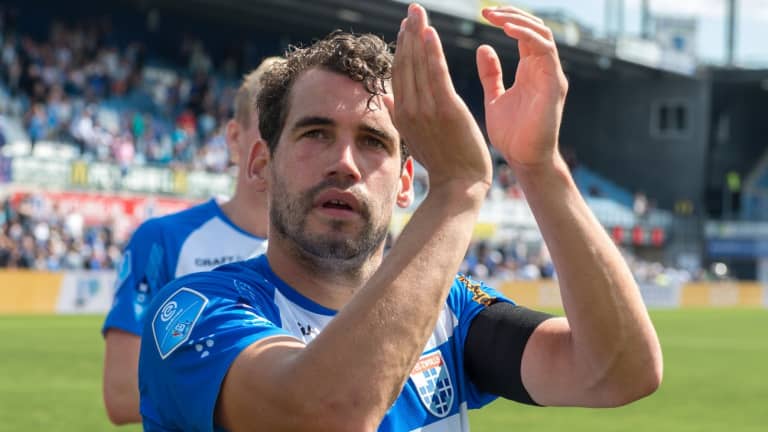
Dirk Marcellis. photo from @PECZwolle, Twitter
The center back made 88 appearances for the club between 2015 and 2018. That means he was part of the side that finished eighth in the league in 2015-16 and helped start a new standard for the team in how it views itself and operates within the community.
“When Zwolle was promoted, the first thing you have to do is stay in the highest league. That’s the biggest priority,” Marcellis said. “And now you can see we can build our youth.
“That’s good for the club, but especially in the area it’s great because they’re really Zwolle guys. So, all the supporters, the little kids, they know them from when they were small children.”
In late June, former Zwolle academy player and first teamer Sepp van den Berg signed with Liverpool, the European champions, despite being just 17 years old. Earlier this month, he made his Liverpool debut in a stateside International Champions Cup match.
While that’s already a monumental achievement, it’s worth noting that van den Berg made his debut at 16 for PEC Zwolle and had played in 16 Eredivisie matches for the club.
Then, he was just the most-recent academy signing to move to a bigger club.
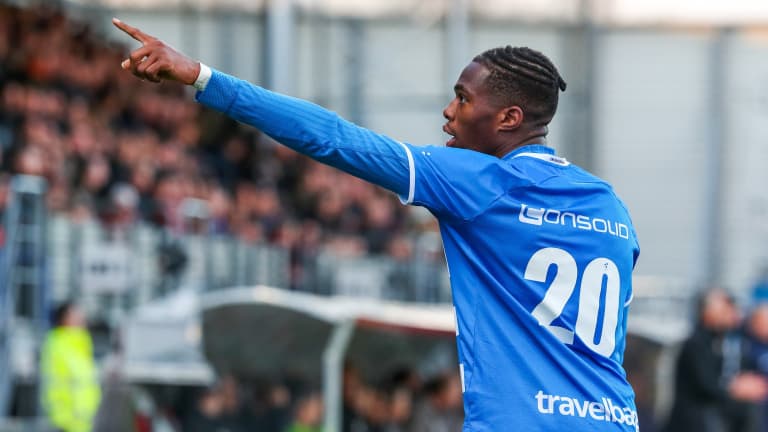
Kingsley Ehizibue. photo from @PECZwolle, Twitter
In the month before, Kingsley Ehizibue signed with FC Köln of the German Bundesliga on a four-year deal. Ehiziebue, a 24-year-old, made his first of 120 appearances for Zwolle back in 2014 when he was a 19.
Before both of them, Philippe Sandler joined English Premier League champions Manchester City from Zwolle last season.
All three of these transfers were significant for Zwolle, and although they might not happen often, they reiterate that the value Nijkamp put on the club’s youth academy is indeed paying off.
“This is a club from the region and Zwolle and that’s the best feeling,” Visser said of having youth players make the first team. “I’m proud. As a chairman, I’m very proud, but this was the result of hard work. The community is very happy and we have enjoyed.”
Gerard Nijkamp walked into the player lounge, grabbed an orange and blue FC Cincinnati scarf and raised it about his head with the smile of a small child. “Isn’t it a beautiful scarf?” he asked to no one in particular.
Those gathered around a high-top table smiled and grabbed one for themselves, too. It was a tangible item from the club Nijkamp is moving to more than 4,000 miles away. The moment highlighted another question, though. Once he goes to FC Cincinnati, what’s he left behind?
Yes, on one hand, he fulfilled Visser’s vision of building PEC Zwolle into an Eredivisie regular. That in itself is an achievement. But so is winning the club’s first major trophy – then another three months later.
Or how about invigorating the youth academy so much that it sent a player to the current European champions?
Oh, and what about the attractive playing style that won over the hearts of Holland?
The truth is there’s no true answer to how important Nijkamp is and was for Zwolle. When he first arrived at the club for the second time, his goal was generating sustainability.
Of course, he created something beyond that: he created hope and belief.
“I believe this club can have a great future and they can be more than 10 years in the Eredivisie,” Nijkamp said about his tenure in Zwolle. “But in the meantime, from 2012 to 2019, yeah, we were winning the cup and getting a good position in the league. We buy interesting players. We sold very good players. We get players from the youth academy like Sepp van der Berg and Kingsley Ehizibue going through the youth pathway and coming into the first team.
“We achieved more goals than to only stay in the Eredivisie for the next 10 years, and that makes me very proud. Of course, I am the responsible person on the technical side, but I did it together with Adriaan Visser, the president. We are working with a great team around us and we build this club to this level.”
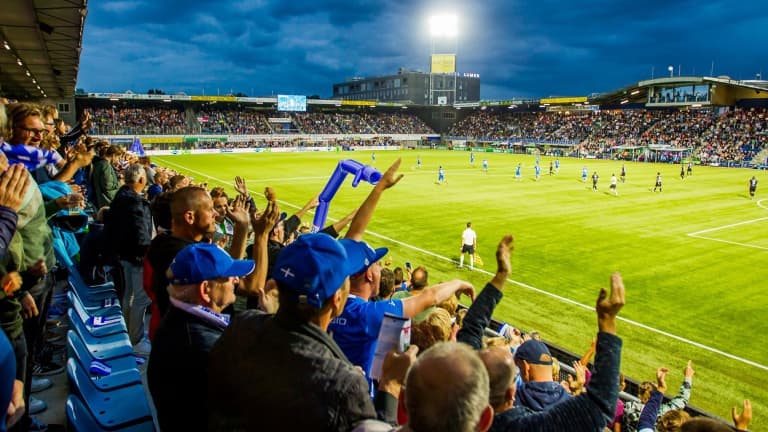
MAC3PARK Stadion. photo from @PECZwolle, Twitter
On Friday night (2 p.m. in Cincinnati), PEC Zwolle hosts Willem II at MAC3PARK Stadion to open the 2018-19 Eredivisie season for all Dutch clubs.
The spotlight will be on Zwolle. What will happen in the first match under new trainer John Stegeman, who just arrived after coaching PEC Zwolle’s arch-rival, the second-tier Go Ahead Eagles.
Will that same beautiful, attractive style still be on display? This is the first league match for the club in the Eredivisie without Nijkamp as technical director since 2003. Does his absence change anything?
These are hypotheticals and the answers will come in time.
What’s for certain, though, is Nijkamp has changed how people view the club.
“They promoted, they stayed and now we are around the 10th position and every ambitious,” Marcellis said. “It’s never like, ‘OK, this is good enough. Let’s hope we stay this way.’ It’s every not just trying to achieve growth in the technical area of the club, but also the organizational area.
“We have to grow every day. It keeps getting better and that’s something we’re really focusing on these days and it’s great.”
During the summer offseason, the club’s stadium capacity grew to 14,000. (It had been between 13,000 and 13,500 the season before.) Zwolle now leads the country seat utilization (number of seats filled) on match days and have a growing fanbase stretching across the region, especially with children. (One of the trophies in the case had to do with best mascot in 2019.)
But people around the city, which has been a settlement that predated the Roman Empire by hundreds of years and earned “city rights” in 1230, view themselves differently, as well.
Last year, FDI Magazine wrote a story in Dutch that translated to “Squaring the Triangle.” Essentially, the major economic hubs of the Netherlands have historically been Amsterdam, Rotterdam and Eindhoven – which roughly form a triangle. By Zwolle growing as a hub, that would shift the economic triangle into a square.
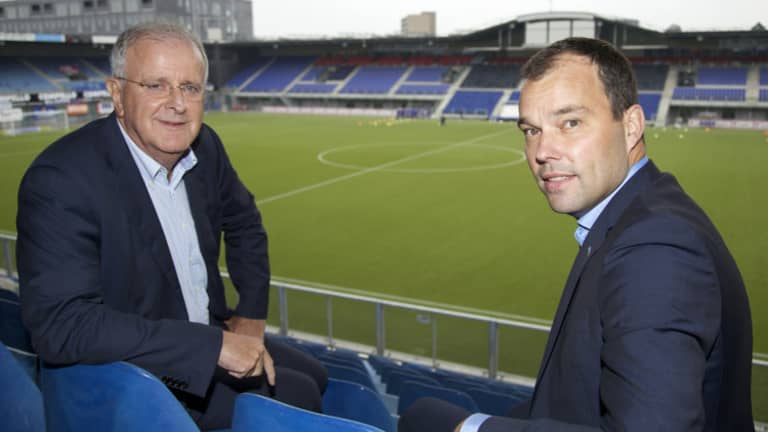
Visser and Nijkamp. photo from peczwolle.nl
For Visser, his club has been in the heart of this growth. What started as a phone call and a promise of relegation prevention has become something better than anyone could’ve imagined.
“The feeling to bring this club to another level is a dream,” the PEC Zwolle chairman said. “I dislike (Nijkamp leaving) because we had a great working relationship with a lot of business. (FC Cincinnati) will benefit and enjoy the experience of Gerard.”
This is what Nijkamp was leaving behind in Zwolle. He called it his child. Others have called their club ambitious and better off because of him. That he’s given a whole city a team to believe in probably speaks the most about what he accomplished.
“It will be a very tough day because there are so many lovely people in this club that I’m really aligned to and feel big attachments to, not just on the business side,” he said. “PEC Zwolle is a family club and we are very close to each other. We have celebrations, but we also have griefs.
“It will be hard Thursday to say goodbye to my colleagues and everyone who’s around the club, from the supporters, the business side, the agents I was working with and even some media. That also shows something from me that I’m a relations guy. I try not to only build a club, but build relations.”
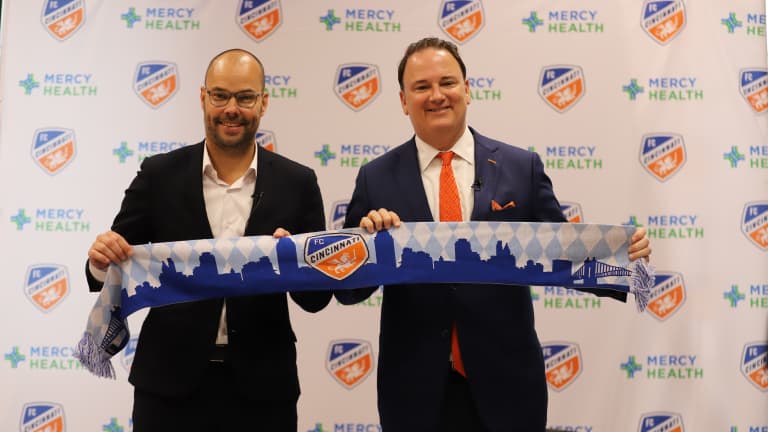
What to expect from Nijkamp at FC Cincinnati
Being in Zwolle didn’t mean Nijkamp wasn’t clocking in at FC Cincinnati.
At his introductory press conference after being hired FCC’s next general manager, the Dutchman arrived at the Mercy Health Training Center sleepy-eyed, jet-lagged and trying to work through a six-hour time zone difference. He had arrived at CVG around 10:30 p.m. the evening before, meaning it was approximately 4:30 a.m. Amsterdam time. After a few hours of sleep, he was set to meet his new team, first at the club’s downtown offices before heading to Milford to officially meet the team and technical staff.
During his press conference, he mentioned he wouldn’t move to America full time until Aug. 1. He actually arrived early – landing in North America on Saturday before attending FCC’s game at Toronto later that night. On Sunday, he flew back to Cincinnati with the club and has already gotten down to work.
Tuesday afternoon, he departed again – this time to go to Orlando to represent the club at the league’s summer spectacle and meet his contemporaries in MLS. The whirlwind week will continue when he returns to Cincinnati, finally, on Thursday.
But in the time between press conference and his full-time arrival, Nijkamp signed Maikel van der Werff – who was also his first signing at PEC Zwolle – from Dutch side Vitesse, and has finalized the recruitment of FC Cincinnati’s newest head coach, who is expected to arrive soon.
He also had multiple phone calls daily with the club’s scouting department (headed by Technical Director Luke Sassano), President Jeff Berding, Interim Head Coach Yoann Damet and others, including assistant coach and Director of Sports Performance Gary Walker and other department heads who work closely with the team.
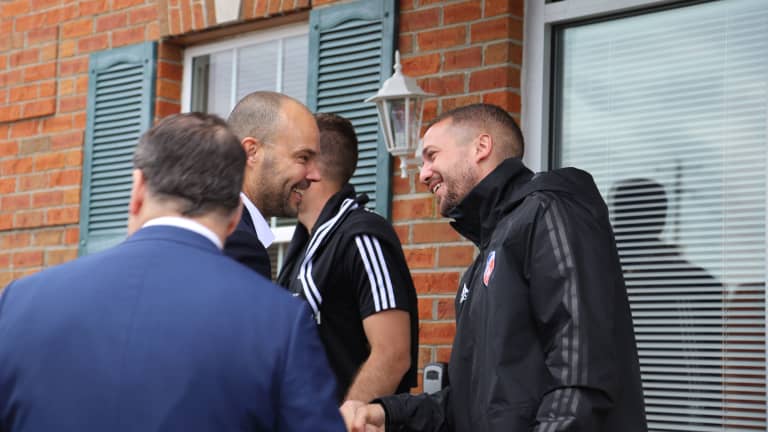
What Damet has done on the field for the Orange and Blue, Nijkamp is trying to do off it. Both have stressed the importance of a club philosophy and identity, and have aligning views.
Therefore, it’s no surprise FC Cincinnati have used a 4-3-3 formation that’s possession dominate, builds from the back and sees an aggressive high press defensively. That’s the way of the Dutch, or as Marcellis calls it, “positive football.”
“It’s play, play, play, search for a gap and then go for it.”
While Aug. 1 was Nijkamp’s expected starting date in Cincinnati, it’s also the starting date for the FC Cincinnati Academy. Considering his previous roles leading academies, he’ll bring that same passion to the Queen City.
“It’s realistic to have high goals and winning more matches than we are doing now,” he said in Zwolle. “From there, we have to create consistency on different sides. That is the first-team roster, that is the infrastructure, the youth academy, that is your screening and scouting to get good players in the bus, but also your human resources and management who are in the bus and who you want to keep on the bus.”
Including Saturday night, when FC Cincinnati play Vancouver Whitecaps FC, the Orange and Blue only have 11 matches remaining in their inaugural MLS season. For Nijkamp, these are the first matches he’ll be able to watch in person at Nippert Stadium.
What he’ll see is average attendances that double his old club’s stadium capacity, and while there’s no pressure to be relegated, there’s pressure to produce a playoff-caliber side. In a few months, the central building at the Mercy Health Training Center will fully open the world-class facility will be complete, almost perfectly leading into the first steel beams going into the ground at the forthcoming West End Stadium.
If Nijkamp left one club with big ambitions, he crossed an ocean to find himself immersed in another.
“I think good expectations for FC Cincinnati and everyone for the future is to build the foundation, not just in the philosophy and out playing style, but in our infrastructure,” he said. “We can expect for ourselves that we can always play for the playoffs. And from the playoffs, I want to go to the next level to win the playoffs.
“I won’t tell you that next season we will reach the playoffs and we will win the playoffs because that is also the roster of our team, what is happening with the budgets, etcetera, etcetera. We are still not playing in the West End.
“But that is the realistic goal for the near future. And we want to be open and transparent with that.”

